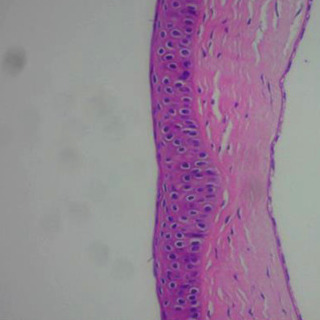Sodium hyaluronate promotes proliferation, autophagy, and migration of corneal epithelial cells by downregulating miR-18a in the course of corneal epithelial injury

All claims expressed in this article are solely those of the authors and do not necessarily represent those of their affiliated organizations, or those of the publisher, the editors and the reviewers. Any product that may be evaluated in this article or claim that may be made by its manufacturer is not guaranteed or endorsed by the publisher.
Accepted: 27 May 2023
Authors
Corneal epithelium can resist the invasion of external pathogenic factors to protect the eye from external pathogens. Sodium hyaluronate (SH) has been confirmed to promote corneal epithelial wound healing. However, the mechanism by which SH protects against corneal epithelial injury (CEI) is not fully understood. CEI model mice were made by scratching the mouse corneal epithelium, and in vitro model of CEI were constructed via curettage of corneal epithelium or ultraviolet radiation. The pathologic structure and level of connective tissue growth factor (CTGF) expression were confirmed by Hematoxylin and Eosin staining and immunohistochemistry. CTGF expression was detected by an IHC assay. The levels of CTGF, TGF-β, COLA1A, FN, LC3B, Beclin1, and P62 expression were monitored by RT-qPCR, ELISA, Western blotting or immunofluorescence staining. Cell proliferation was detected by the CCK-8 assay and EdU staining. Our results showed that SH could markedly upregulate CTGF expression and downregulate miR-18a expression in the CEI model mice. Additionally, SH could attenuate corneal epithelial tissue injury, and enhance the cell proliferation and autophagy pathways in the CEI model mice. Meanwhile, overexpression of miR-18a reversed the effect of SHs on cell proliferation and autophagy in CEI model mice. Moreover, our data showed that SH could induce the proliferation, autophagy, and migration of CEI model cells by downregulating miR-18a. Down-regulation of miR-18a plays a significant role in the ability of SH to promote corneal epithelial wound healing. Our results provide a theoretical basis for targeting miR-18a to promote corneal wound healing.
Ethics Approval
Ethical approval was obtained for all experimental procedures by the Ethics Committee of the Hunan Provincial People's HospitalSupporting Agencies
Natural Science Foundation of Hunan Province of China, Ren Shu Foundation of Hunan Provincial People's Hospital, Research and Development Program in Key areas of Hunan Province, Department of Education of Hunan ProvinceHow to Cite

This work is licensed under a Creative Commons Attribution-NonCommercial 4.0 International License.









